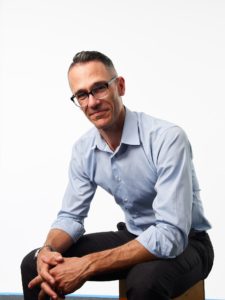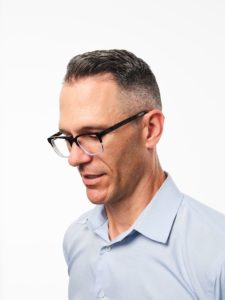Jacob Ward truly embodies the meaning of a renaissance man; he is an accomplished writer and editor, NBC News correspondent, scholar at Stanford University’s Center for Advanced Study in the Behavioral Sciences (CASBS), television host, and former Editor in Chief of Popular Science magazine. His expertise in technology and journalism is unmatched, yet his demeanor incredibly warm and inviting.
With this resume, it should come as no surprise that we’re honored to be welcoming Ward to the YTH Live stage. We are thrilled to announce that Ward will be delivering the keynote speaker at our opening plenary of this year’s conference.

Portrait by Spencer Lowell, 2018. Image courtesy of the Berggruen Institute.
Over the past year, Ward has been writing a book about artificial intelligence, based on his research and studies at Stanford. He is planning to bring the problem that many are worried about, but afraid to express, when it comes to AI technologies—automation threat to completely replace human skill and connection.
To gain further insight into Ward’s extensive background, the details of his plenary, and his advice for aspiring young tech journalists, we spoke to him personally to give you a glimpse into one of the brightest minds in technology today.
YTH: We’re thrilled to have you as a plenary speaker at YTH Live 2019! What can we look forward to hearing you discuss at your opening plenary presentation?
JACOB WARD: I’m writing a book about how AI is poised to change human behavior. Other people — including lots of the biggest ethics groups around AI — are worried that AI will somehow slip the bonds of human control and enslave us all. My worry is about a short-term amplification of bad habits through AI, such that we wind up enslaved not by some external robot brain, but by the worst parts of our OWN brain. I’ve been talking all over the world about this problem, and I’m excited to bring it to YTH Live.
YTH: You are currently serving as a Berggruen Fellow at Stanford University’s Center for Advanced Study in the Behavioral Sciences (CASBS) and are writing a book about AI, as a result of your research. You’ve also been quoted in KQED recently about the implications of smart speaker technology for youth. What has your work and experience in this position taught you about how young people are being affected by the increasing amount of artificial intelligence they are being exposed to?
JW: I’ve been spending my time trying to connect certain fundamental human mental habits with the rise of automation, and the big one is anthropomorphism (the technical term for ascribing human sophistication and attributes to them that they just don’t possess). I think one vast complication for young people is that at a time when they should be developing their critical faculties — the ability to squint at a thing and say “that’s not right” — there are going to be so many companies and services out there using artificial intelligence to deliver recommendations to them about everything from entertainment to factual information. So I’m worried that all of that rapid-fire convenience, delivered in the guise of a can’t-be-wrong technology, is going to wear away at the good old fashioned skepticism of young people.
YTH: Following this, our world is becoming increasingly reliant on not only technology but automation. What are the broader implications of automation for future generations— should the youth of the future be concerned that they could be competing robots for jobs? How do you see the future of AI unfolding?
JW: I’m certainly worried that jobs are going to disappear. A few years ago I might have told you that while I thought certain pattern-recognition or pick-and-place jobs were vulnerable to automation, the jobs that involve a certain indescribable humanity, like writing, or cooking, are safe from automation. Not anymore. It’s not just that the automated systems are better than ever, it’s that science is revealing that human taste and emotion obeys a bunch of laws that can be taught to an automated system. Robots are going to impersonate our artistic impulses — they’re already doing it — and we’re going to wind up fooled. So, I’m hoping we can fight off a certain amount of that impersonation by getting young people to put a premium on authentic human creativity.
I hope we can also teach even the youngest kids to recognize in themselves the lessons that science is beginning to teach us about how easily fooled we are, how thoroughly biased we can be, and how predictable each of us is.
YTH: You have an extensive background in journalism and media, include a role as Editor in Chief at Popular Science. How did you develop an interest in technology? Have there been any challenges in combining technology and your creative pursuits?
JW: I was a humanities and media geek, and set out to be a writer and editor at magazines, but pretty quickly I discovered that rather than just doing a sort of open-ended journalism, I much preferred focusing my work through certain very specific beats. The first one was architecture and design — I’d write about cultural attitudes toward the incarcerated, for instance, by writing about how prisons are designed. Science and technology turned out to be the ultimate extension of that idea — that by looking at human innovation, we learn the secret motivations of human society. It’s a wonderfully helpful way to investigate the world, I’ve found.
YTH: What advice would you give to young people who are interested in pursuing a similar career path or are interested in technology, but perhaps not wanting to pursue a traditional career in STEM?
JW: There is an explosion of interest right now in broadening the training of engineers with lessons from the humanities. I’d suggest that anyone with a basic command of data science — how to pull answers from a big unstructured pile of information — is already on their way to steady employment for the rest of their lives. But if you can combine that with a specialty in something like history, or philosophy, or international diplomacy, you’ve got a real expertise that will never go out of fashion.
YTH: Nowadays, the common notion seems to be that technology has become necessary for young people’s daily lives, as their school work, social relationships, and entertainment revolve around screens. What do you think technology’s role in society is for youth?
JW: I think we should be pushing technology for young people — but at the last possible moment in their cognitive development. First let’s teach kids to think critically, to be creative, to believe in themselves. Then, and only then, should we put them in front of code. That’s what I’m trying to do with my own kids. I hope we can follow that model on a larger scale.
We certainly can’t wait to talk more about this model of youth development at YTH Live 2019. Register for the conference here, for the chance to connect with Ward and his work personally at the this year’s event. If you want to learn more about Ward’s professional background and expertise, visit his website here.

JACOB WARD, Journalist and Television Correspondent
Jacob Ward is technology correspondent for NBC News, where he reports on-air for Nightly News with Lester Holt, MSNBC, and The TODAY Show. The former editor-in-chief of Popular Science magazine, Ward was Al Jazeera’s science and technology correspondent from 2013 to 2018, and has hosted investigative documentaries for Discovery, National Geographic, and PBS. As a writer, Ward has contributed to The New Yorker, The New York Times Magazine, Wired, and many other publications. His ten-episode Audible podcast, Complicated, discusses humanity’s most difficult problems, and he’s the host of an upcoming four-hour public television series, “Hacking Your Mind,” about human decision making and irrationality. Ward is a 2018-2019 Berggruen Fellow at Stanford University’s Center for Advanced Study in the Behavioral Sciences, where he’s writing Black Box: AI, Bias, and the Fight to Amplify Humanity, due for publication by Hachette Book Group in 2020. The book explores how artificial intelligence will amplify good and bad human instincts.
